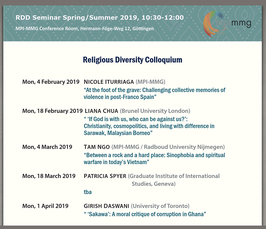" ‘If God is with us, who can be against us?’: Christianity, cosmopolitics, and living with difference in Sarawak, Malaysian Borneo"
Religious Diversity Colloquium Spring/Summer 2019
- Date: Feb 18, 2019
- Time: 10:30 AM - 12:00 PM (Local Time Germany)
- Speaker: Liana Chua (Brunel University London)
- Liana Chua holds a PhD in Social Anthropology from Cambridge and is now Reader in Anthropology at Brunel University London. She has long-term ethnographic interests in Sarawak, Malaysian Borneo, where she has worked with indigenous Bidayuh communities since 2003, looking at conversion to Christianity, ethnic and religious politics, development and resettlement. She is the author of The Christianity of Culture: Conversion, Ethnic Citizenship, and the Matter of Religion in Malaysian Borneo (2012) and co-editor of several edited volumes, including Who are ‘We’? Reimagining Alterity and Affinity in Anthropology (2018). She is currently leading a large multi-sited research project that explores the global nexus of orangutan conservation in the age of ‘the Anthropocene’.
- Location: MPI-MMG, Hermann-Föge-Weg 12, Göttingen
- Room: Conference Room

For more details please contact vdvoffice(at)mmg.mpg.de.
This lecture puts the analytic of “indigenous cosmopolitics” in dialogue with the anthropology of Christianity through an ethnography of a dam-construction and resettlement project in Sarawak, Malaysian Borneo. Drawing on long-term fieldwork, I explore how both God and Christian ethno-theology became imbricated with a group of indigenous villagers’ legal struggle to resist the scheme and the template of progressive, modern citizenship bound up with it. I suggest that the villagers’ efforts constituted a form of Christian cosmopolitics that sought to disrupt Sarawakian politics-as-usual by bringing a previously inconceivable outcome—and a different way of being different—into being. Their eventual victory and its aftermath, however, raise critical questions about the limits and untapped possibilities of “cosmopolitical” proposals, as well as about contemporary anthropology’s own ethico-political approaches to difference.